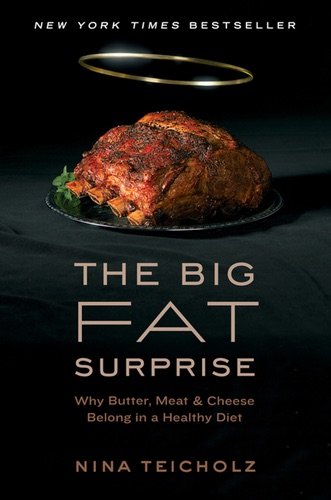Hello reporters,
Because there’s so much misinformation out there about me/my book, I thought I’d just put together a quick fact sheet:
- The Big Fat Surprise is not a diet book. It contains no recipes and does not recommend any particular diet. It is a serious book of non-fiction, on the science, politics, and history of nutrition policy. (It was also highly acclaimed: named a Best Book of 2014 by The Economist, the Wall Street Journal, Forbes, Mother Jones, Library Journal, and Kirkus Review, it also got very strong reviews in The American Journal of Clinical Nutrition, The Lancet, and The BMJ.)
- The Big Fat Surprise is not a “pro-meat” book. It is about saturated fats. Saturated fats are found mainly in dairy, meat, some fish, and tropical oils, although it’s important to note that most foods are a mixture of different types of fats. For example, most beef is high in oleic acid, which is the same type of fat as found in olive oil.
- The Big Fat Surprise is not even a pro-saturated fats book, as in, it doesn’t argue that you should eat a lot of these fats. The book’s basic argument is that these fats should be let out of jail. The Big Fat Surprise is the first publication to make a comprehensive, systematic critique of the longstanding hypothesis that saturated fats cause heart disease, and it concludes that these fats were unfairly maligned and are almost certainly not the primary cause of heart disease. This is not as crazy as it sounds: there are now nearly a dozen meta-analyses and systematic reviews that have found either no association between these fats and heart disease (observational evidence) or no effect of these fats on cardiovascular mortality (RCTs), although in some cases the latter is mitigated by which macronutrient to which sat fats are compared. In any case, sat fats always look healthier than carbohydrates in these comparisons, which is a problem for official dietary recommendations, since they remain restricted in sat fats and high in carbs (over 50%).
- The Big Fat Surprise does not argue that a high-fat, low-carb diet is the right diet for everyone. It reviews the science showing that this diet is a highly effective alternative for people with metabolic diseases–obesity, diabetes, heart disease.
- For the general population, The Big Fat Surprise concludes that a healthy diet is one that is higher in fat than the longstanding low-fat diet. The “low-fat” diet refers to the one described widely in the scientific literature and recommended by the government: generally 30% of calories as fat, although this number has ranged from 25-35%. To give some perspective: In 1965, Americans ate <40% carbs, >40% fat, and <20% protein. Since 1980, the government has recommended diets that are >50% carbs and 30-35% fat. I think that a reasonable general recommendation is to return to the ratios of fat/carbs/protein that we ate before embarking on this low-fat, high-carb experiment
- My work and research has never been supported by any industry nor do I work with any industry. Since the publication of my book, I have been paid modest honoraria to present my research findings to various organizations, including some industry groups but also universities, medical groups, foundations, etc.
- Yes, I was a low-fat eating “near vegetarian” for some 20 years: I ate no red meat, no eggs, no butter, no full-fat dairy, little cheese, mostly plants with small amounts of chicken and fish and virtually no junk food (Also known as the USDA-recommended diet). On this diet, throughout my young adulthood, I was about 20 lbs heavier than I am today, as a middle-aged woman. Also, I exercised nearly every day for about an hour vs. nearly zero exercise now (because I have no time, not because I don’t like it!).
- Selling books is not my principal motivation for bringing new ideas to the debate on the science and politics of nutrition. I’ve made very little from my book, actually, and it’s ludicrous to think that I would have spent nearly a decade researching a non-fiction, noncommercial book of science and politics as a means to riches. During all my years of research, I was compelled, instead, by a desire for truth, which I believe is a kind of justice. The public deserves to know that the science on diet and disease is uncertain–and that their long-held beliefs may not be true, and indeed, may be making them sick. After writing my book, I came into contact with all the people who are suffering, from obesity, heart disease, diabetes and more–all while following the “official” dietary advice; people told me how they had recovered after reading my book, and all these stories and emails gave me further motivation to keep working.
- My work is not “full of errors,” as my critics are attempting to allege. Because my work is controversial, it has been subject to unusually intense scrutiny (A prominent critic, CSPI, for instance, sent dozens of emails to the New York Times when that paper published an op-ed by me), yet in the end, there have been only minor corrections to my work; none of them, in my book or elsewhere, are significant enough to cause any change in any argument.
- I am an advocate for truth and policy based on rigorous science. I’m not an advocate for any particular diet. I do this advocacy via The Nutrition Coalition, where I currently serve as the Executive Director.
- For more information, see the FAQs.
- Please do not hesitate to contact me: teicholz@gmail.com The great majority of errors about my work occur when reporters do not get in touch to verify their information.
- A press facts sheet on The Big Fat Surprise is here.



Hi
I was very interested in your comments written in Medscape.
Had you ever read a paper published in Science Sep 5, 2005 entitle “The soft science of dietary fat”, I hope you do, there are more about politics involved.
Other exciting paper that maybe crossed your research was “MONICA The Frech Paradox”, and you will see different prevalence of CHD even thought the mean total cholesterol levels are not significantly different in Europe And the US. And if you dig a little bit further you would find out that pretty much 50% of the patients admitted with MI had almost normal lipid profile.
Just let me know what do you think of this.
Yours sincerely
Dear Jose,
I have read that paper in Science–thanks. It’s a seminal one by G. Taubes. I have also read all the papers on MONICA. And I know that MIs have no relationship with either total cholesterol or LDL-cholesterol. Indeed, so many of our ideas are not based on good evidence–which is why it took me so long to write my book. Thank you for your comment.
Saw the short piece on Fox News, sorry Tucker Carlson couldn’t stop gloating over government failure long enough for you to deliver your message about your book. I look forward to reading it. Thank you!
I hope that you enjoy it! The role of government failure is a small part of the larger story. Really, it is a story about the failure of science.